It's yours to get through it! Zhu Changhui has transformed the friendly agricultural method for 11 years, and the healthy yield of willow is large, and the flesh is full of meticulous flavor.
3 shared
"Picking oranges under the east fence, leisurely see Nanshan." Just change a word, Zhu Changhui's state of mind, and Tao Yuanming's poem completely overlapped.
In Chungliao, Nantou County, a small valley isolated from the rest of the world, this natural-loving fruit grower quietly worked as a friendly farmer for eleven years. The willow he grows has also gone through a low point of transformation, and now its yield has not only recovered to the level of traditional farming methods, but also has fine flesh and sweet and sour flavor.
Ten years passed quickly, and Zhu Changhui's hair was gray. Sitting in front of his work room, he slowly exhaled smoke and looked at the mountain opposite, recalling the little things he had done in this small valley over the years. He was a mountain farmer and loved to do things but not talk about them. However, it was too difficult for Liu Ding to do things organically. Ten years of experience was precious and should be shared with other citrus farmers.
"Citrus to do organic impossible," that year there were experts so bluntly. "In the first two or three years, the frustration was the greatest, the quality was poor, and the quantity was small. At least it dropped to 18,000 jin. It's okay to reduce income, but what I'm most afraid of is receiving customer complaints all day long."Zhu Changhui, who is calm, only remembers those years before he appears with a lingering fear.
Compared to this year's 42,000 kilos of willow, Chu and his wife and their 600-odd fruit trees have really withstood it. Eleven years of experience have accumulated confidence, and next year they are ready to move on to organic testing. "Upstream and Downstream" specially asked them to share their "breaking customs" experience in detail.
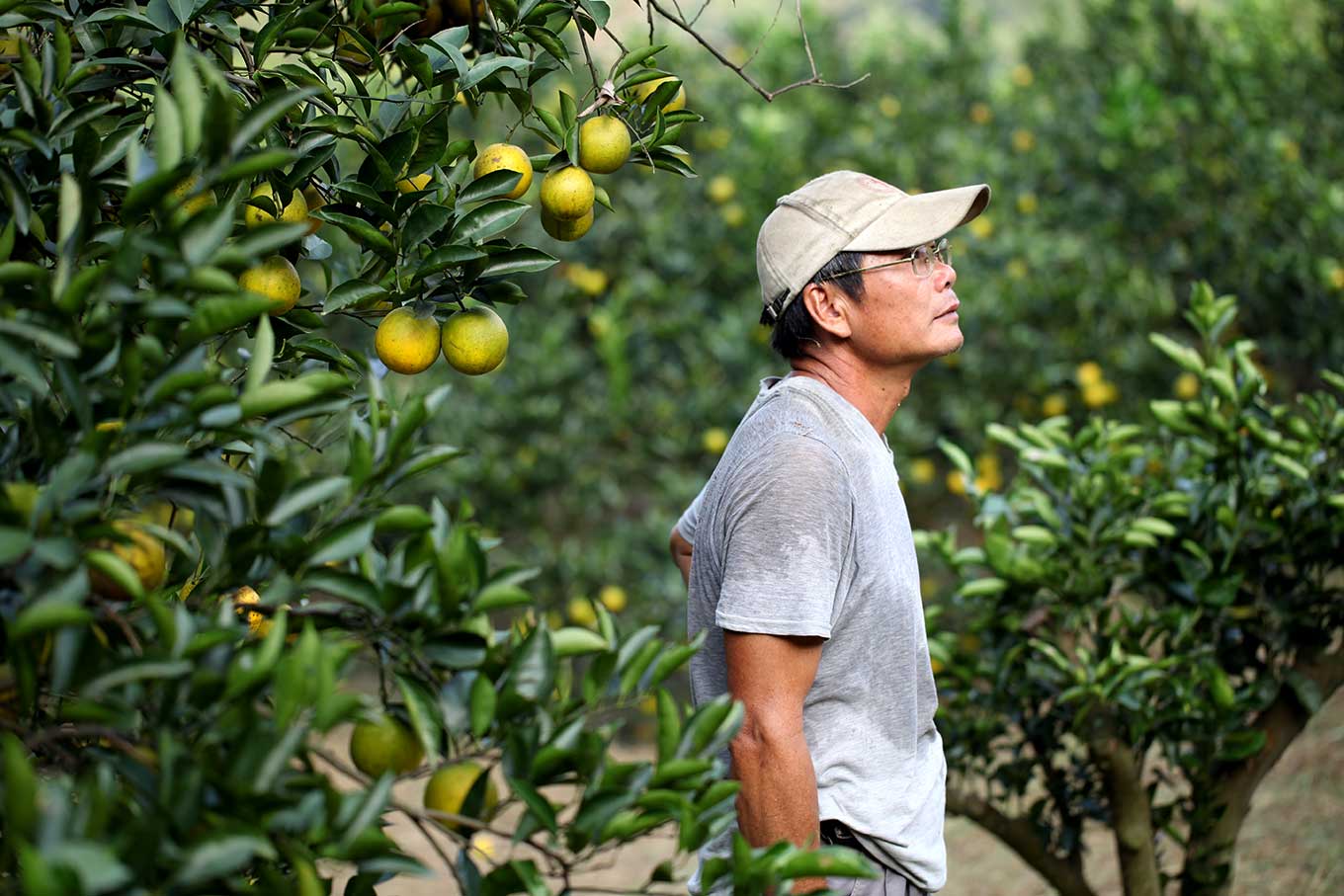

Zhu Changhui (Photo_Alittle) Deep hole application to retain fertilizer, but also let the root system breathe deeper
Zhu Changhui believes that the most important thing is to fatten,"to be willing to give it to eat." When he took over his father's orchard, the soil was barren and hardened. After the organic transformation, he could no longer apply chemical fertilizer, but changed to organic fertilizer, but found that it seemed that no amount of fertilizer was enough.
"Liu Ding is very good at eating. Generally, fruit trees can still grow very well after two or three years of neglect. At most, they won't grow any fruit. Liuding is different. If you don't fatten it for two or three years, it will die."
Most of Chungliao's orchards are on sloping land, and fertilizer is lost at the first drop of rain. Chu Chang Hui therefore drilled holes around the tree heads, eight holes per tree (this year there were ten holes), and accurately poured fertilizer into the holes one by one. Other people apply fertilizer is a big hand, fertilization only a few days, their husband and wife fertilization, a total of two months.
However, this move has multiple effects. Drilling holes to apply fertilizer deeply can not only protect fertilizer from washing away, but also allow roots to breathe and promote roots to grow downward. The fruit trees had sufficient nutrition, and their physique was strong. Their ability to resist drought, cold, and pests had also been improved!
Zhu Changhui said that farmers should not only look at the top of the tree, but also look at the bottom. The branches and leaves above are weak, which means that the roots below are also weak. On the contrary, the roots below are strong, and the leaves, flowers and fruits are also vigorous. So from time to time to dig properly, to see the fruit tree roots and soil conditions.
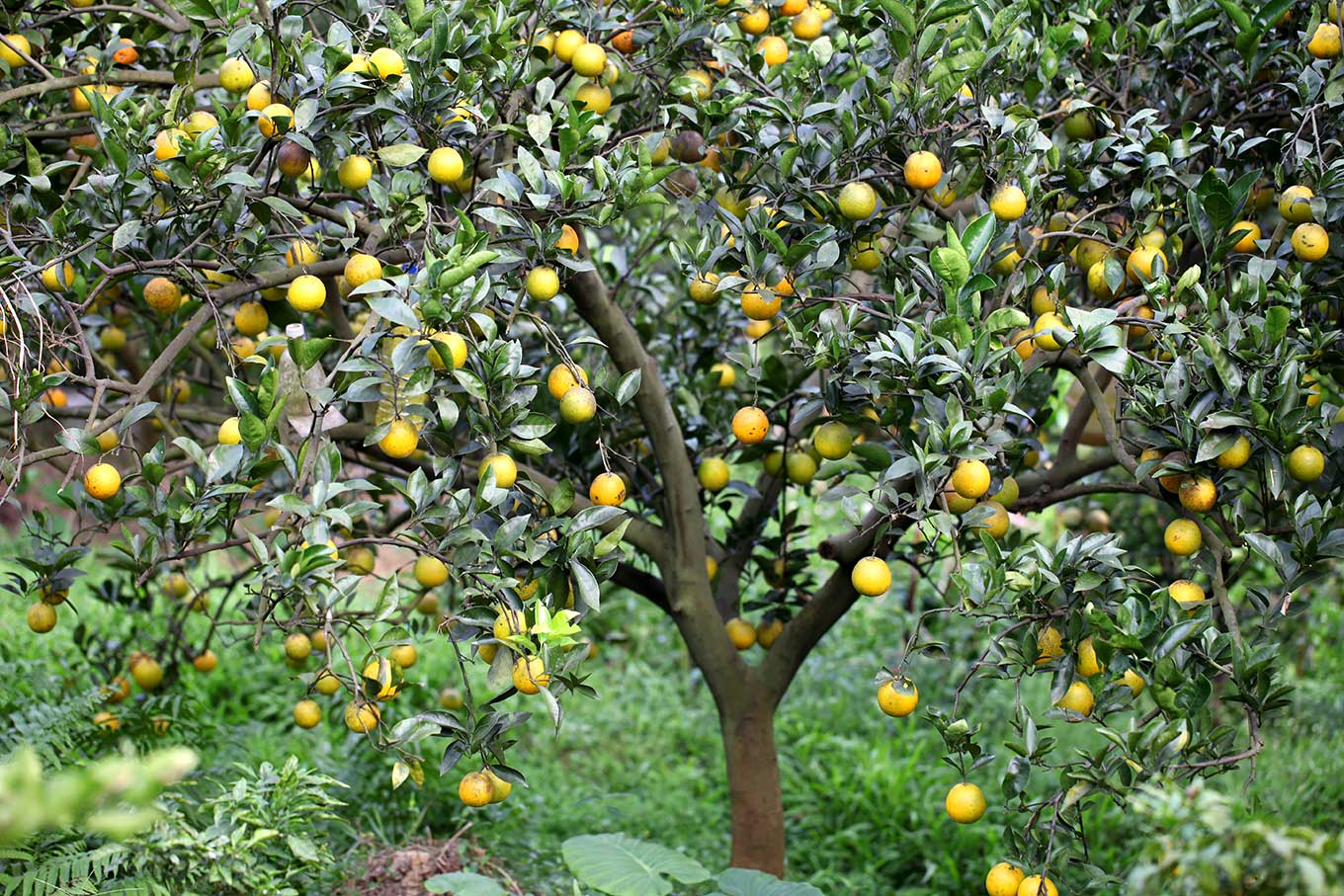

Mature Orange (Photography_Alittle)
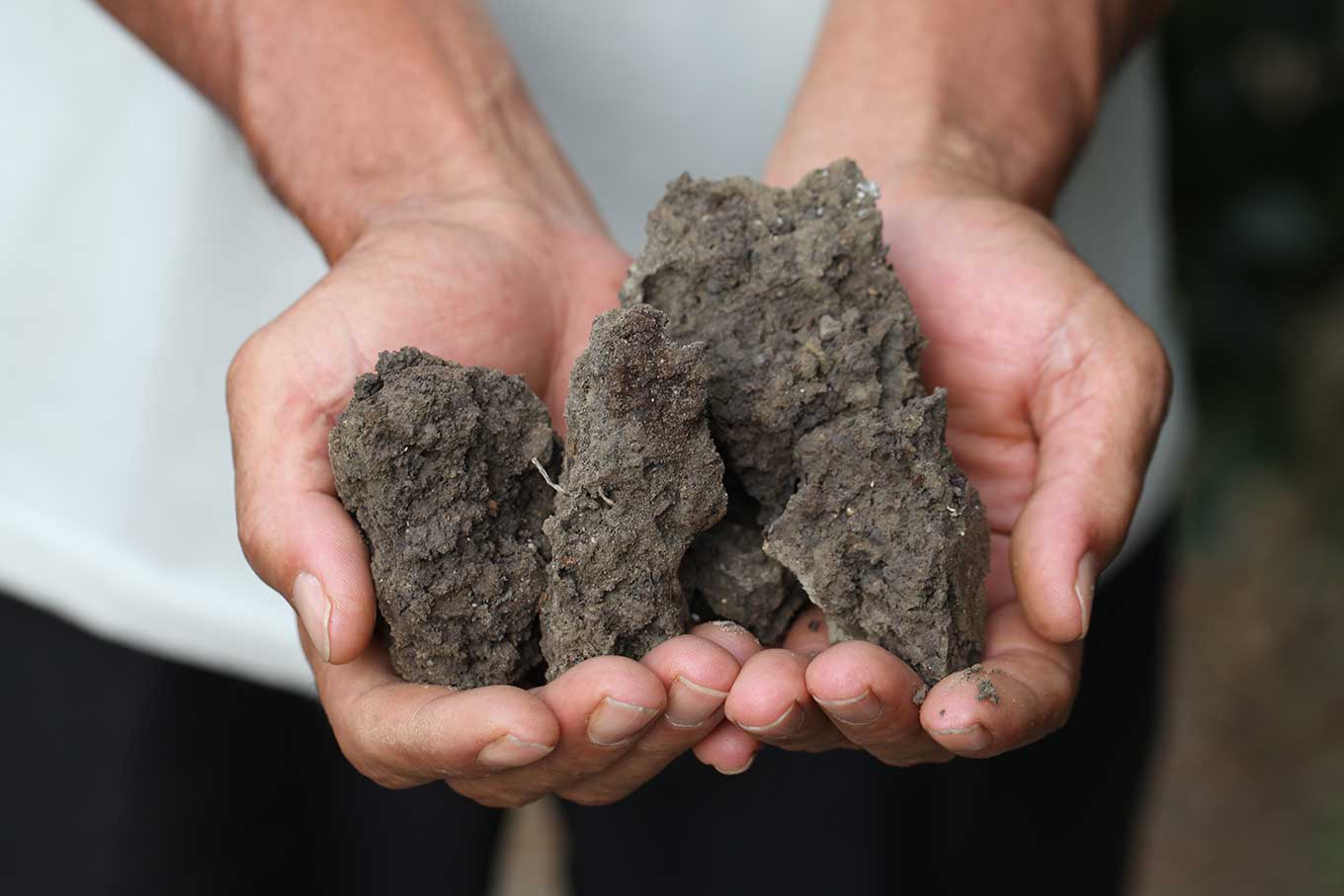

The soil in the orchard (Photo_Alittle) pays attention to the rootstock root system, Guangdong lemon is not as strong as sour orange
However, after the protective shield was removed, not only did the yield and quality of willow trees, which were originally used to chemical fertilizers and pesticides, decline, but the weaker fruit trees also fell ill and even died. Zhu Changhui pointed out that the root of the problem comes from the rootstock of willow saplings.
It turns out that most of the willow seedlings sold in the market are based on Guangdong lemon, that is, the base of the sapling is Guangdong lemon, and the top is willow. Chu's fruit trees used to be like this, but in recent years he has gradually eliminated old, diseased trees and planted saplings with sour oranges as rootstocks.
"Guangdong lemon has very few roots, only a few taproots, while sour orange has dense fine roots, which are very strong." Zhu Changhui explained that seedling merchants like to sell willow seedlings of Guangdong lemon rootstock, some people also under the guise that Guangdong lemon can resist Huanglong disease, in fact, because Guangdong lemon in seedling stage development is relatively fast, only two years can emerge, while sour orange takes three years. But when planted, sour orange because of dense and strong roots, will catch up with Guangdong lemon seedlings.
Zhu Changhui field observation,"I here a few years ago when the nematode occurred, the performance is very obvious, the Guangdong lemon trees on a look of dying, sour orange are very healthy."
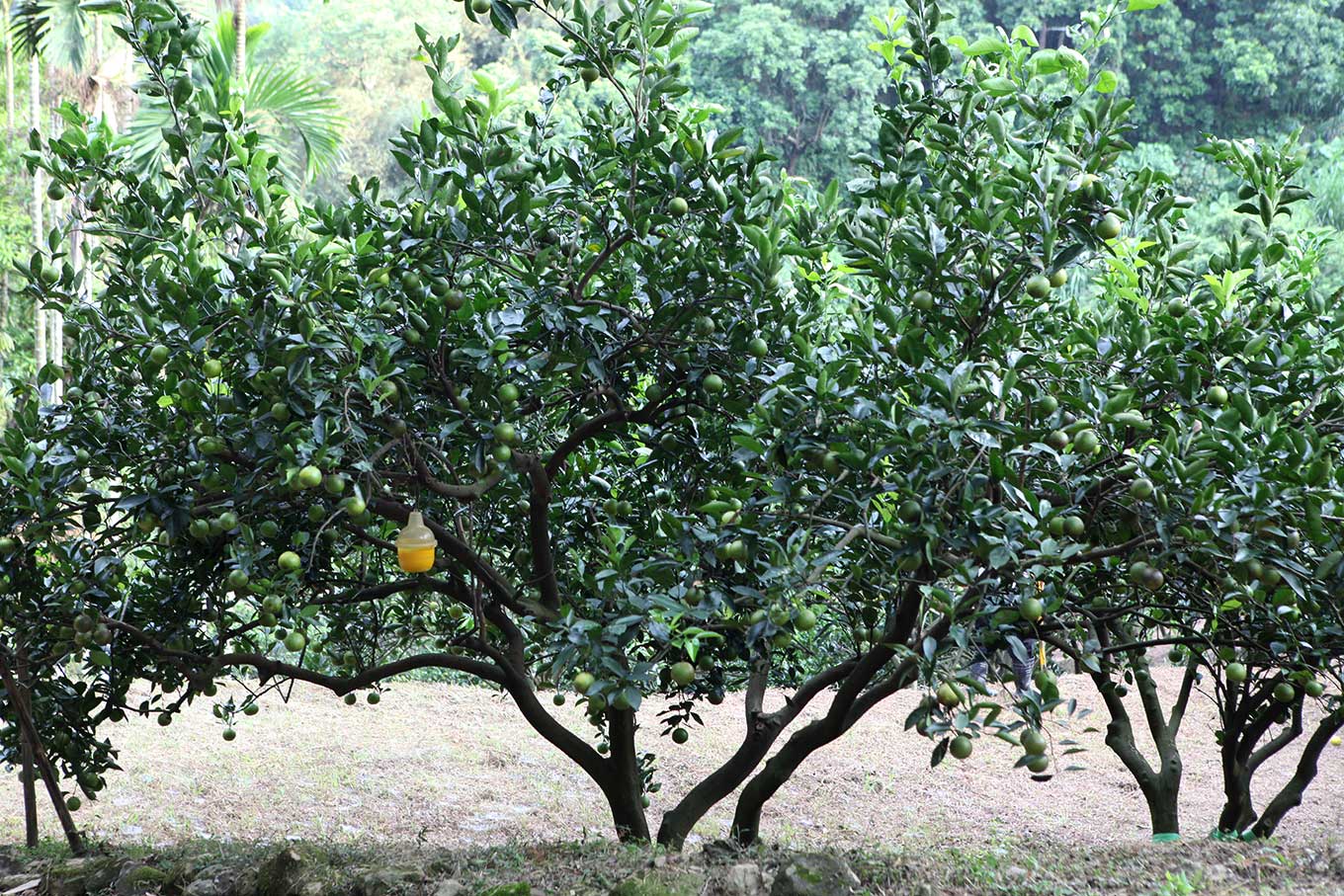

The willow tree stretches naturally and the tree shape is elegant (Photo_Alittle). Transferring flowers and trees, the "close to" method makes the fruit trees rejuvenate.
Chu grew up farming with his parents and graduated from horticulture. He used to work in landscape engineering. Every holiday, he went back to Chunghsiao to accompany his parents and doubled as a "holiday farmer." Therefore, farming is not only a livelihood for him, but also an interest. He also has a basic profession. When he turns to organic farming, he encounters problems. Although he needs to think hard, he is not at a loss.
In order to save endangered fruit trees, he used a big trick_to sour orange rootstock "close" to the fruit tree head, so that the fruit tree "old rejuvenation."
Careful observation of Zhu Changhui's willow trees will find that some fruit trees are surrounded by several "supports", that is, sour orange branches. With these new rootstocks, he attached them to fruit trees originally rooted in Guangdong lemons. When the sour orange roots flourished underground, the fruit trees could get more resources from the soil.
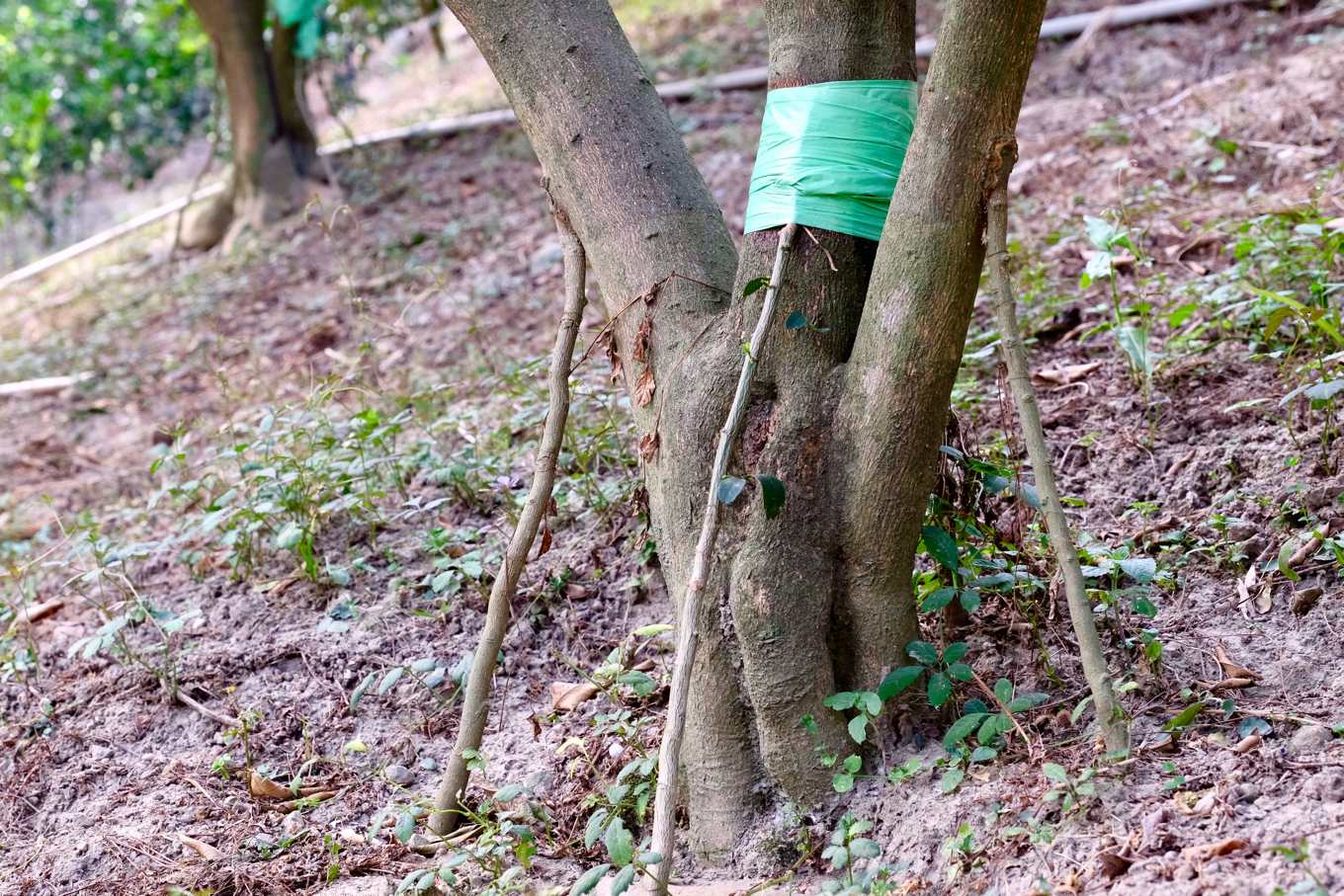

Close to (Photo/Cai Jiashan)
Strolling in the garden, Zhu Changhui pointed to a tree and said,"This tree was dying of skin rot before, and it was saved by connecting it."
As a result, the twenty-year-old trees stand more firmly on the ground, gain new strength, and bear more beautiful fruits. Cut open the ripe, still a little green Liuding, flesh fine grain, sour fragrance burst into the mouth, strong and charming flavor. When the golden color is ripe, the taste must be more round and sweet.
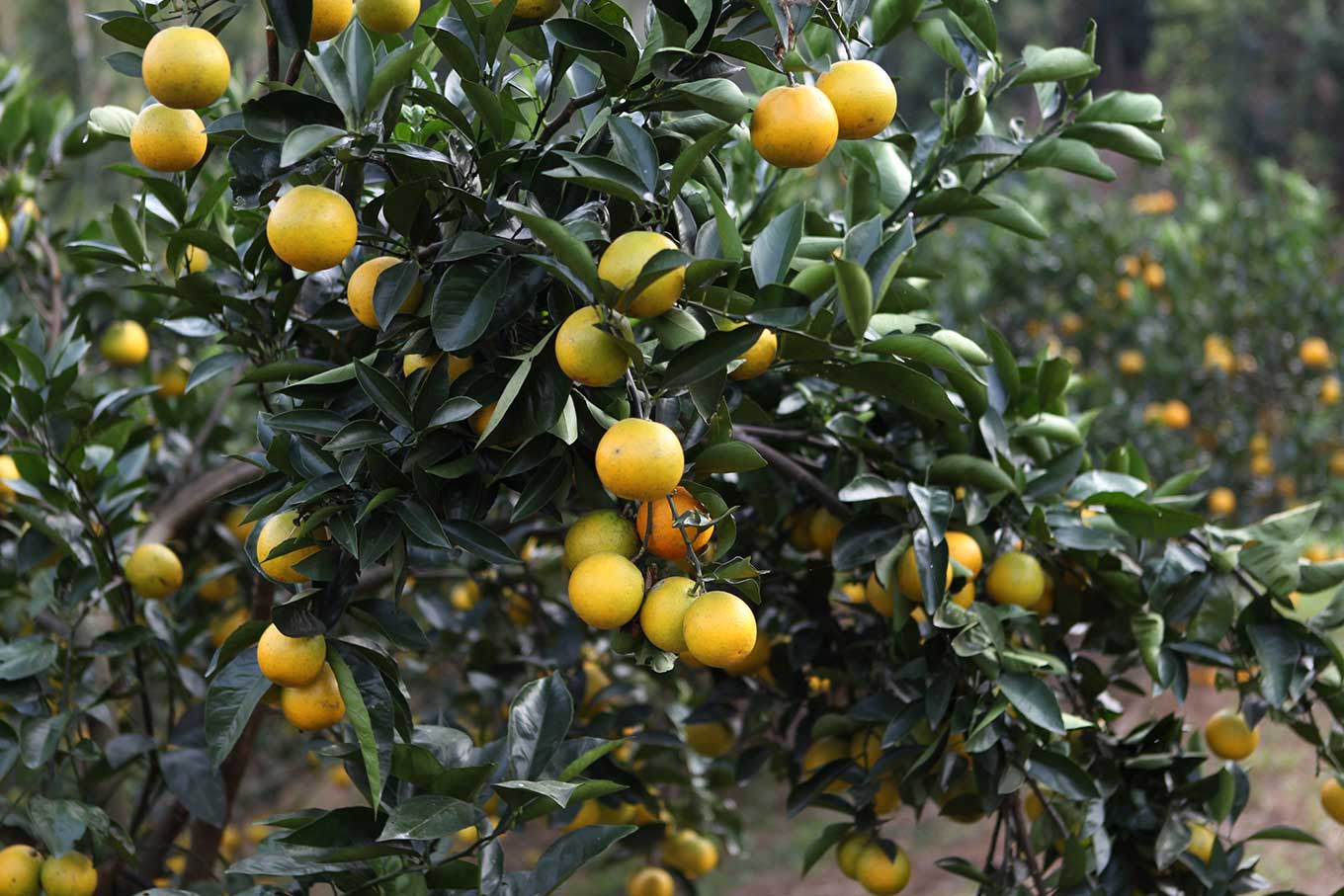

Mature Liuding (Photo_Alittle) Dayu water control, perennial water conservancy projects to help fruit trees resist drought and flood
The years in the mountains seem quiet, but climate change has become increasingly intense in recent years. What is the impact on willow trees?
"I think it's okay for the temperature to rise, but the rain has a bigger impact," Chu explains. Weather adversity is either sudden rainfall or prolonged drought."Extremely dry" and "extremely wet" form a great test for willow trees.
"So I put a lot of effort into 'water'!" Several years ago, Chu Changhui began to carry out long-term soil and water projects in his orchards.
He built a long retaining wall high up on the orchard slope to intercept the flow of water, and buried many hidden pipes under the orchard floor, pierced holes in the pipes and covered with nonwoven cloth. In this way, when heavy rain comes, rainwater can be collected, water flows into pipes through holes, and then transported to wells through these pipes, and then pumped to water towers for storage. When the dry season comes, these pre-stored waters can be used for watering.


Underground pipes are buried to drain water from the soil into wells (Photo/Cai Jiashan)


A large water tower for storing rainwater, which can be watered during drought (Photo/Cai Jiashan)
Keeping grass is also a key. "Grass is very useful. The biggest benefit is in soil and water conservation." And mowed grass is the best organic matter and home to microbes. He said that no amount of organic fertilizer can exceed the organic matter brought by grass.
Zhu Changhui felt and said,"Now do farming, already can't look at the sky to eat!" In the past, sloping orchards were just looking at the sky. Unless there was a serious shortage of water, trucks would be hired to transport water for irrigation. But now the climate is extreme, farmers need to have more skills, such as this kind of water conservancy project also need to understand,"To be a knowledgeable farmer, not to work hard."
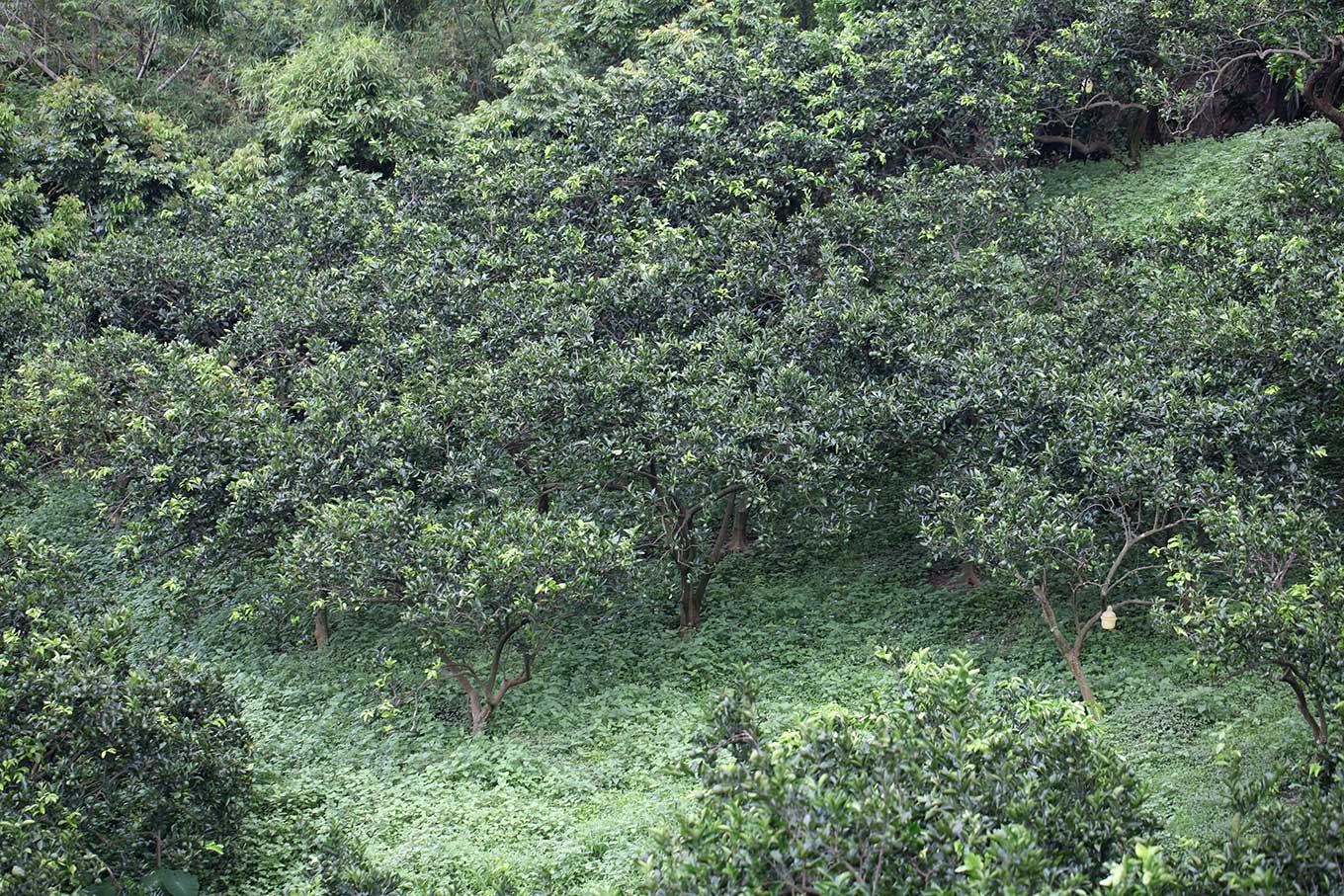
- Prev

A large-scale outbreak of radish lettuce pollution in the United States has caused kidney failure in five people. Taiwan has imported from contaminated areas, but the flow direction is unknown.
A large-scale outbreak of radish lettuce pollution in the United States has caused kidney failure in five people. Taiwan has imported from contaminated areas, but the flow direction is unknown.
- Next

Hou Youyi, mayor of Xinbei Hangjia Bar, worked hard to promote the good taste of the season.
Yunlin Weekly Exhibition, a joint venture between New Taipei City and Yunlin County, opened a lively sale at Zhongshan Store in Yuanbai Banqiao on the 1st. Mayor Hou Youyi was present to promote local characteristic agricultural products such as Gukeng Liu Ding, Yunu Little Tomato, Black King Kong Peanut, etc.
Related
- A course of planting techniques and methods on how to grow carrots
- How to plant the latest tulips?
- Is it better to pick tea in the morning or in the afternoon? When is the best time for tea to be picked? what is the third or fifth tea?
- Launch Yuanxiao Happy combination Haocha + Tea Yuan healthy Taste
- Penghu Tourism "Fireworks 20 Parade with You"
- 2022 West Lake Happiness holds "Digital Revitalization Voucher" and draws iphone13 and laptop.
- Banqiao Fuzhou social houses are designed to change start-up combined with police elimination to create a safe and livable environment
- The convenient measure of "mechanical weeding" in Xinbei has been abused and the Agriculture Bureau has imposed heavy penalties on the illegal land consolidation.
- Changgeng University Joins Hands with Four Memory Factories to Rescue Memory Talent Shortage
- The list of Taiwan's top 100 MVP managers is listed by the Director-General of the Farmers' Association of Sanxia District.

